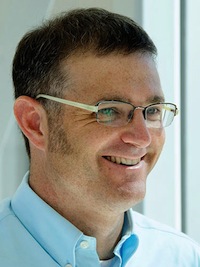Momentum builds for campus research computing
Faced with computing infrastructure limitations that might stymie researchers elsewhere, UW–Madison scientists and investigators have always found ways to do more with less. With no central supercomputer facility and campus researchers constantly seeking more network bandwidth, researchers have obtained the computing power they needed by being innovative, often creating their own independent computing services based on small and relatively inexpensive machines.

Paul Wilson
Now, UW–Madison’s Advanced Computing Infrastructure (ACI) is building on a campus history of innovation and cooperation. It’s taking steps to provide expertise, hardware, and software in support of research computing — leveraging shared campus resources to help researchers improve their use of computers for scholarly work.
“I see ACI as more than hardware and facilities. This campus has long lacked that person who wakes up every morning worrying about UW–Madison’s research computing,” says Paul Wilson, a professor in the Department of Engineering Physics and faculty director of ACI. “The ACI effort offers a remedy, providing an advocate for cyberinfrastructure at one of the biggest research campuses in the world.”
ACI staff will include research computing facilitators, who will match scholars with the computing resources most appropriate to their needs. In some cases, those will be the shared resources that ACI is now acquiring. They might also be other computing services, either on or off campus.
“The facilitators will be connectors, lowering the barriers to access,” Wilson explains. “The facilitators will know what the options are and will share a common understanding of how to deliver services for scholars.”
ACI is working to establish partnerships with several existing research computing providers on campus, including the Center for High Throughput Computing (CHTC), DoIT, the Social Science Computing Cooperative (SSCC), and the Biotechnology Center.
“We can offer scientists a full portfolio of computing choices to hit the sweet spot of the research they’re doing.”
Paul Wilson
“We can offer scientists a full portfolio of computing choices to hit the sweet spot of the research they’re doing,” says Wilson. “Researchers may not need as much deep technical knowledge of computer systems.” Moreover, he says, campus partnerships that include ACI could free existing centers to focus on what they do well, rather than take on work that doesn’t necessarily fit with their mission.
Over the last year, ACI has made significant progress. It has:
- Established a committee of scholars to oversee ACI development.
- Encouraged the formation of user communities in various fields to share ideas and solutions.
- Hired the first of several research computing facilitators.
- Acquired a high-performance computer which, when operational in June, will mark the first time UW–Madison has offered such a powerful shared computing capability of this kind.
- Received approval to hire more staff and purchase equipment as part of a campus initiative to improve research computing. Funding comes from UW–Madison and from National Science Foundation (NSF) grants.
- Utilized a gift from John and Tashia Morgridge to help build out the core 100 gigabit campus network and acquire a computing cluster that has already helped the campus achieve record levels of high throughput computing.
Largely through CHTC, the campus is already providing more research computing services than ever before, and the ACI initiative will accelerate that. Designed for expansion, the systems can grow as campus needs increase.
As part of its outreach efforts, ACI held a “Software Carpentry Bootcamp” April 29-30. More than 30 faculty members, research staff, post-docs, and graduate students learned some of the fundamentals needed for research computing. Several more such sessions are envisioned, providing essential skills to a range of scholars in all UW–Madison divisions.
By September, ACI hopes to offer a fellows program that will provide financial support to graduate students who gain entry through a competitive application process. These students will use their fellowship experience to introduce advanced computing practices to their home research groups.
“ACI’s goal is to help UW scholars from all disciplines to use computing in their research,” says Wilson. “We want to talk to anyone who wants to talk to us. If you need research computing resources or expertise, ACI can make the connection.”
Contact ACI via email at ContactACI@lists.wisc.edu.
— Joe Rossmeissl
Tags: research
